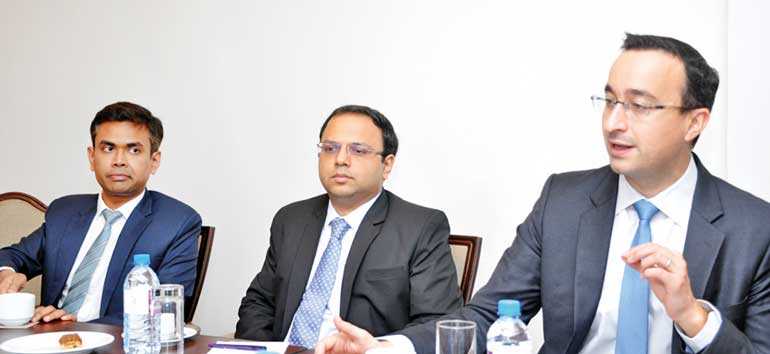Wednesday Feb 18, 2026
Wednesday Feb 18, 2026
Thursday, 21 February 2019 02:37 - - {{hitsCtrl.values.hits}}

Standard Chartered Bank says external factors favourable for Lankan economy this year, domestic challenges remain
Lower oil prices, a less robust dollar, dovish US Fed among positives for SL
Slower global GDP and trade concerns along with debt servicing challenge
Tips 4.2% growth in 2019 and 4.5% next year provided macroeconomic stability, fiscal and monetary policy discipline and reforms pursued
By Nisthar Cassim
Global giant Standard Chartered Bank yesterday predicted external factors are likely to be less adversarial for the Sri Lankan economy in 2019, though domestic challenges remain, whilst prospects would be much better next year.
Lower oil prices, dovish policy by the US Federal Reserve, a less robust US Dollar, and foreign investor focus on South and Southeast Asia resultant to the US-China trade war, are some of the factors that will have a positive impact on the Sri Lankan economy, according to Standard Chartered Bank Global Chief Economist David Mann.
Sharing key highlights of its Global Research Briefing 2019 in Colombo, Mann said global growth and world trade were expected to be less buoyant this year.
SCB forecasts US growth to be moderate, to 2.6% from 2.9% in 2017, but remain robust supported by consumer spending. It expects the Fed to continue hiking the FFTR in the latter part of 2019. Euro-area growth is likely to slow further to 1.4% in 2019, and the ECB is expected to delay rate hikes until December 2019. In terms of China, the forecast is a growth of 6.4% in 2019, which is above market consensus with policy support, and the growth outlook for ASEAN remains robust, despite external headwinds, supported by domestic demand strength and infrastructure expenditure.
SCB expects the Sri Lankan economy to grow by 4.2% this year, up from an estimated 3% in 2018 and to be bettered by 4.5% in 2020.
The Bank’s South Asia Economist Saurav Anand said Sri Lanka will grow better this year and next, aided by macroeconomic stability, less pressure on the rupee, and tighter fiscal and monetary policy.
However, he predicted 2019 will be a challenging year in terms of the looming debt-servicing challenge, and hence a reserves build-up would be necessary. “The Government will have to raise $ 5 billion by March or April, whilst the debt repayment challenge coincides with the election cycle. Creating a reserves buffer will be advisable before elections set in,” he opined.
It was pointed out that it was welcoming that the Central Bank of Sri Lanka has moved fast and appropriately, and that its borrowing plan is executable, although timing is of essence.
Anand and other SCB officials were of the view that international capital markets will have adequate appetite for Sri Lanka’s borrowing needs, whilst overall investor sentiment on the country post-constitutional crisis has improved the same as on emerging markets.
SCB expects on-going IMF talks to conclude positively, with a possible extension of the program.
The Bank’s Head of ASA FX Research Divya Devesh opined that in 2018, the US Dollar became overvalued, but would be relatively subdued in 2019. He also said that as is the case with many countries suffering from current account deficit, the Sri Lanka rupee too responded accordingly last year, but is unlikely to be overvalued in 2019 as it used to be in 2018.
“External developments will be friendlier for Sri Lanka, though domestic factors pose a mixed bag,” he added.

CB seen keeping rates steady as political tensions ease
Rupee ends higher as banks sell dollar; stocks at near 4-month low